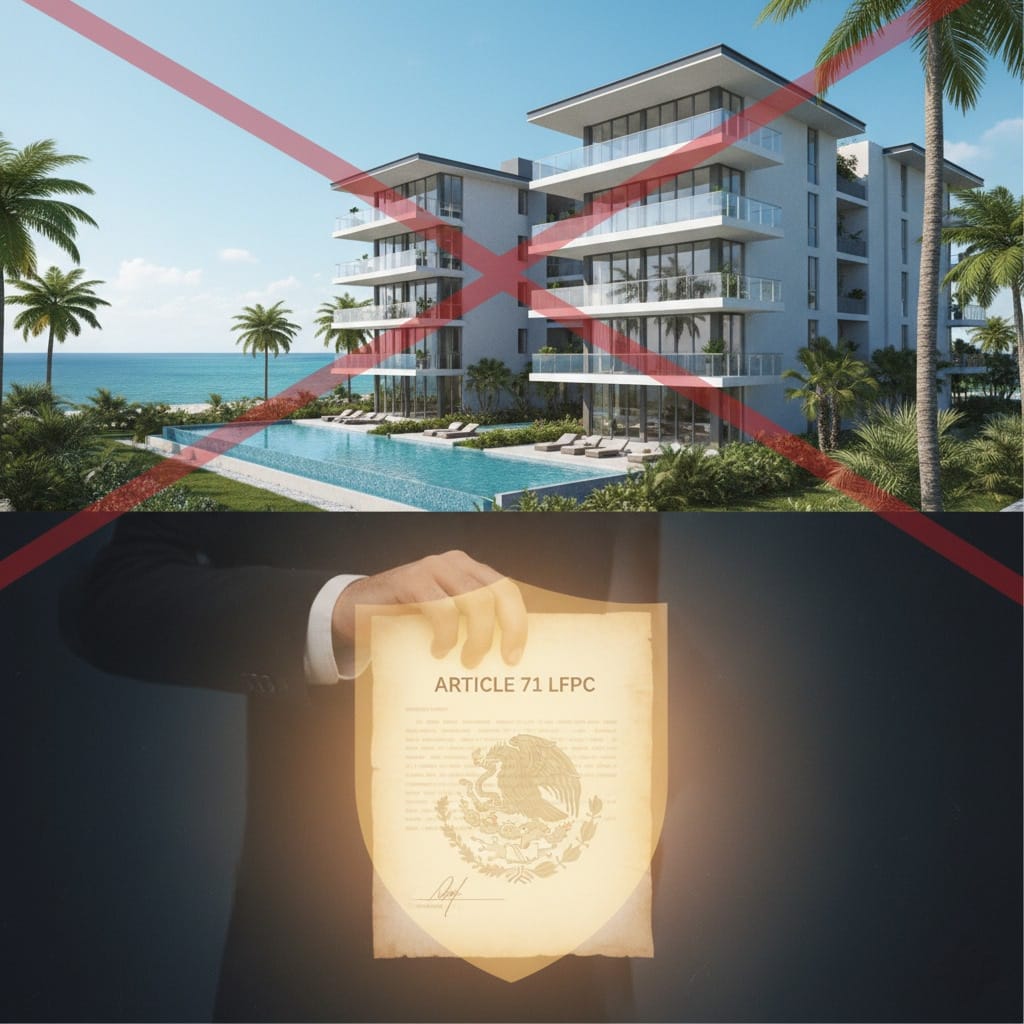Missed a Property Payment in Riviera Maya? You May Not Lose Your Investment.
Learn how Mexico’s Consumer Protection Law helps buyers who default on property payments, protecting them from aggressive penalty clauses.
Buying a pre-construction property in Playa del Carmen or Tulum is exciting. You sign the contract and make your monthly payments. But what happens if life gets in the way and you miss one? Many developer contracts include harsh penalty clauses. These clauses often state that you will lose your contract and all the money you have paid. This is a terrifying thought for any foreign buyer.
However, Mexican law provides strong protection against this. The Federal Consumer Protection Law (LFPC) has specific rules that can save your investment. You have rights, even if you default on property payments in Mexico.
Understanding the “Automatic Forfeiture” Clause
Many promissory contracts (contratos de promesa) are written to strongly favor the developer. They often contain a section called a “conventional penalty” (cláusula penal). This section can be a trap for unwary buyers. It might say that if you are late on a single payment, the contract is automatically terminated. Furthermore, it might state that the developer gets to keep 100% of your payments as a penalty.
This practice allows a developer to profit from your default. They can simply wait for you to miss a payment, cancel your contract, and keep all your money. Then, they are free to resell the same unit to someone else, often at a higher price. Fortunately for buyers, this type of aggressive clause is often unenforceable in court.
Your Strongest Defense: Article 71 of the LFPC
Mexico’s Federal Consumer Protection Law (LFPC) is a powerful tool. Its rules are considered “public order.” This is a very important legal concept. It means you cannot accidentally sign away or “waive” your rights. Even if your contract says you waive this protection, that specific clause is not valid.
Article 71 of this law directly addresses installment sales. This includes most pre-construction payment plans. This article creates a critical dividing line for a buyer default on property payments: the one-third (1/3) threshold. Your legal position changes completely depending on how much of the total price you have already paid.
The “One-Third Rule” Explained
The rule is simple but powerful. You must first look at the total price of the property as stated in your contract. Then, you must calculate the total amount you have already paid (including your down payment and installments).
- If You Paid Less Than One-Third: The developer can start a legal process to rescind (terminate) the contract if you default. You are still entitled to get your money back. However, the developer may be allowed to keep a portion as a penalty, as defined and limited by the law. They cannot necessarily keep the full, abusive amount written in the contract.
- If You Paid More Than One-Third: The power shifts entirely to you. The developer cannot unilaterally or automatically rescind the contract. The law recognizes that you have significant equity in the property. Therefore, it provides you with a crucial choice. You, the buyer, get to decide what happens next.
Your Two Choices When You Default (After Paying 1/3)
If you have paid more than one-third of the total price, the developer cannot just kick you out. You have two distinct options under the law.
Option 1: Cure the Default and Keep Your Property Your first right is to continue with the purchase. You can choose to “cure” the default. This means you must pay the installments you missed. You will also have to pay any legally due interest or charges for the delay. These charges must be reasonable and lawful. They cannot be the exaggerated, million-dollar penalties the developer wrote into the contract. This option is your best path. It is ideal if you still want the property and can secure the funds to get current.
Option 2: Rescind the Contract and Get Your Money Back Your second right is to choose rescission yourself. Perhaps your financial situation has changed. Or maybe you no longer trust the developer after their threats. If you have paid more than one-third, you can be the one to terminate the contract.
Most importantly, you are entitled to a full refund of the principal amounts you have paid. The developer cannot use the “conventional penalty” clause to keep all your money. This is a critical protection. It prevents the developer from being unjustly enriched by your situation.
Why Consumer Law is Stronger Than Your Contract
This protection often surprises foreign buyers. How can the law simply ignore a clause that you signed? A key court decision (Jurisprudence Registry No. 171064) clarified this exact point.
The court confirmed that the LFPC’s rules for consumer protection are special. They take priority over the general civil code rules (like Article 1949 of the Federal Civil Code). The civil code just talks about mutual obligations. The consumer law, however, is designed to protect the economically weaker party—you, the consumer. This legal precedent stops developers from using unfair, one-sided contract terms to take advantage of buyers.
What to Do Immediately If You Miss a Payment
If you are late on a payment, do not panic. Your entire investment is likely not lost.
- First, review your contract and your payment records. Calculate exactly how much you have paid. Determine if you have crossed the one-third threshold.
- Second, do not sign any new documents from your developer. They may try to pressure you. They might offer a “new deal” or a “settlement” letter. These documents are often designed to trick you into signing away your rights under Article 71.
- Third, contact a specialized attorney immediately. Navigating a buyer default on property payments in Mexico requires expert legal guidance. A lawyer can formally notify the developer of your rights. This action often stops a developer from taking illegal action against you.
Facing a payment dispute or a contract cancellation threat in the Riviera Maya? Don’t navigate it alone. Contact PeninsuLawyers to protect your investment and secure your property rights.



